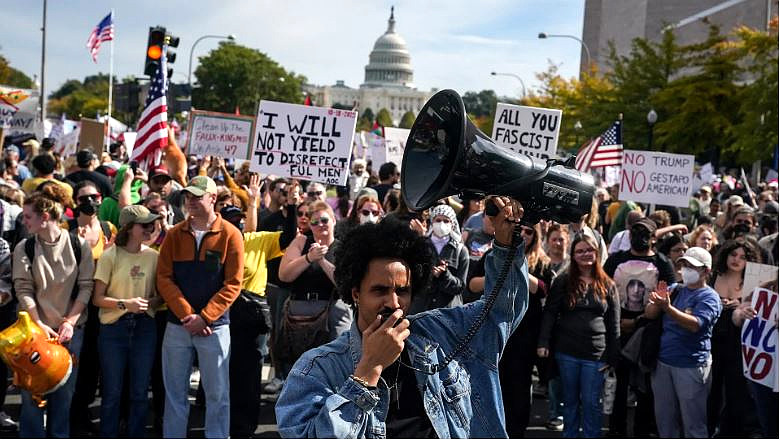|
“No Kings” protests in the USA Thabiso: Good evening, professor. Professor, the No Kings protest drew millions from across the United States. What do you think this scale of mobilization says about the current state of American democracy? What do you think? Patrick: Well, it’s quite possibly the biggest protest in the country’s history, in 2600 different places, at least 7 million people. Now, you remember 4 months ago, the first round of the No Kings protest in June attracted about 5 million. And now, I think there’s not just a rising confidence, but a desperation, a sense that Donald Trump isn’t letting up. And even though he had some major problems with Elon Musk, raised in Johannesburg, Pretoria and Durban, Elon Musk which was part of the protest - that is the protest against the budget cuts - the department of government efficiency - the cuts especially to medical aid - there there’s a sort of Medicaid program for poor people about 15 million - are having their health benefits cut in early January. These are the sorts of things that all across the world including on the African continent are making a lot of people very angry and going to the streets. And that’s a very healthy sign for democracy at a time when there’s also a great deal of fascistic let’s say hard-right politics in the US top down. And those include especially the ICE, the border control and all of the problems associated with with the well let’s say ideology - the Christian nationalist, xenophobic, racist and Islamophobic and sexist, anti-trans - all of the sort of politics you see from Donald Trump and his people. And now there’s a resistance. It is quite heartening to see that. Thabiso: It seems like it’s been a long time coming. And given the fact that you’ve written about intersection of populism and neoliberalism, how do you interpret the Trump movement’s endurance despite growing public discontent? Patrick: You know, the main thing that Trump has going for him is a lot of money. He’s got the billionaire class and that would include his old ally and then, you know, sort of frenemy - Elon Musk, the richest man in the world, and now the second richest man, named Larry Ellison. And he’s now buying a huge chunk of the media, just as Elon Musk bought Twitter and renamed it X. So when you get that sort of financial power and influence, then you’ve got an incredible machine. Now the machine isn’t good enough to keep Donald Trump’s programs in the even majority popular mode. I mean, he’s really polling around about 41%, one of the lowest ratings at somebody who’s just only eight months, nine months into his presidency. So, there’s certainly a big problem he faces, which is when there’s another election next year for the members of Congress, the Senate. He’s probably going to lose control of the House and the Senate, the two parts of the Parliament, the Congress. Now that means that the kinds of programme he’s had to just ramrod, especially the tax cuts for the billionaires and those health care cuts, plus what we would be concerned with here especially in South Africa - the destruction of USAID which includes the AIDS medicines, the emergency food relief and humanitarian support. Places like Sudan will probably lose hundreds of thousands of people because of those cuts. And then climate change, because Donald Trump’s a climate denialist. And then let’s overlay on that the trade policies. And those are the source of what I think is going to be an upsurge of inflation - the price increases in the US - that will increasingly turn his base against him. So he’s looking at roughly just over a year from now - the election - where he may lose his Congress. So he’s really moving quickly. Now, that includes the destruction of civil liberties, of freedom of speech, of democracy. Even the sorts of things I’m saying will now be considered the kinds of things that could lose people their passports or not let them come in and out of the United States - especially if we can add, on top of that, US support for the genocide by Israel of Palestine. Now, this means that like Nazi Germany in the 1930s, there has to be an uprising. In the 1930s, unfortunately, there were sufficient numbers of the white male working class who were co-opted into Hitler’s project - just like the white male working class is co-opted not only into Donald Trump, but we could add Nigel Farage, the number one political leader at the moment in Britain. He could well become the next prime minister. Or Marine Le Pen in France. Or the Alternative for Germany; in Germany, that’s the far-right party. In Italy there’s already a far-right prime minister. And we’ve seen that, of course, in the south. I happened to have been in Brazil last week, and Jair Bolsonaro was another example. Or we could look at the Philippines. Or many places have these far-right populists who’ve picked up on the crisis of the cost of living for your average working-class person. And instead of the working class turning to the left, as they are, actually, in many African countries like Madagascar last week, or Morocco a couple of weeks ago, Tunisia last month, Kenya about three months ago. In Africa, I think we actually have a situation where the populism is a left populism demanding social justice. And unfortunately in the US, until we saw on Saturday the potential of left-wing mobilization, it’s actually been a confirmation of fascism. And that means I think in the US we’re really seeing a civil war. I lived there about 25 years, so I can smell that. I worked for some political figures like Jesse Jackson, and I worked in the journalistic field, and I can really smell a sort of rise of populism that becomes fascism in the US. And it’s really important what we saw on Saturday: that is, resistance. Thabiso: You are reading into the situation that many of the protesters are warning against the slide toward authoritarianism. From a global perspective, do you see echoes of this in other countries? You mentioned Johannesburg when you were talking to us here in South Africa. What do you think could be the sentiment? Patrick: Yeah, I’m sorry about our line not being so strong on this because it is the most important question. You know, because we’re hosting the G20, we think of top-down politics, but actually what we’re seeing now, and last week in Madagascar and Tunisia and Morocco, Kenya, plenty of places, we’re seeing now, bottom-up politics. That is, we may even see it here in Johannesburg, host of the G20, where there’s so much resistance to electricity disconnections in the townships or water disconnections, even where I’m speaking from in Melville, Johannesburg, near the University of Johannesburg. These are the sorts of things that have led populations to protest, and major upturns in a left politics. And I think we’re going to see much more of that. And that’ll probably, at the end of the day, outrun what the right-wing can offer, because they simply - as Donald Trump shows - have only more of the same austerity along with the social reactionary policies. Now, in the US, like here, we do have a xenophobia phenomenon. And that may be the basis for a short-term rightwing rise here, especially with some of the politicians like Gayton McKenzie supporting xenophobia. That may be the basis for a similar bounceback of the fascist tendencies that we’ve seen in the US. But I do have the hope in humanity that the kinds of resistance - and especially the needs of people - ordinary people who need water and electricity, which were the basis for the Madagascar protests, or to protest the debt. That’s where the Kenyans and their Gen Z demanded a debt audit, just the way I think South Africa could. Saying well, ‘what were these loans for?’ Medupi, Kusile, Transnet’s locomotives? Those were corrupt loans to corrupt companies – that’s well established, nobody will dispute that. And why should we be repaying the banks when indeed that means we have less money for all the other things that the society needs, including infrastructure, or my own students’ budgets in NSFAS and in the tertiary education sector? These are the sorts of things that are motivating people all over the world to question: well, maybe the elites have too much power: the oligarchs, the rich people. And that, I think, would be the basis for not a right-wing turn that we’ve been seeing - but as we saw on Saturday, instead in the US, and maybe elsewhere as well, Italy, for example, with a national strike on behalf of Palestinians last week, and plenty of other suggestions - that we have potential for a revival of left-wing populism against the right-wing populism of Trump and his friends. Thabiso: And lastly, Professor Bond, do you think the No Kings movement can push for real systemic change or would it be absorbed by the existing political establishment as often happens with popular uprisings? Patrick: You’re absolutely right that that is typically what happens: assimilation, co-optation, a lack of forward momentum, a loss of energy, disillusionment. Some of the political leaders cutting deals. But you know, I don’t think that’s going to happen. And the reason is: they are moving in such an extreme way towards civil war in the United States. And that means that I think the kind of left traditions that we saw - for example, to end the Vietnam War in 1968 or with Martin Luther King and civil rights, or with women, with gay, lesbian movements, with - I even participated in - the anti-apartheid movement. There can be bottom-up processes that can overcome the top-down elite agenda. And I think that’s actually going to continue. I look forward to hearing more “No Kings” — that is, against Donald Trump’s violation of civil liberties and his fiscal policies. Thabisa: Professor Bond, thank you for your time this evening. https://www.youtube.com/watch?v=9J5VWjo-hcU Back |
|
||||||
|
|||||||




